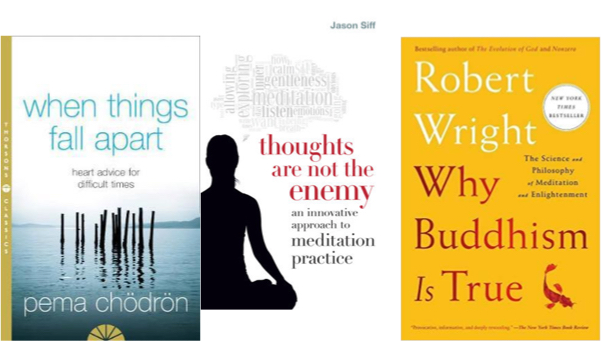
It was September 2019. I had had difficulty ploughing through Richard Wright’s book, Why Buddhism is True. And I had recently “read” When Things Fall Apart (by Pema Chödrön) — which I found helpful in some respects, but also repetitious and lacking in rigour. So it was that the science journalist, Peter Brems, recommended to me the book, Thoughts Are Not the Enemy: An Innovative Approach to Meditation Practice, suggesting it was very different from Wright’s and quite worth the read.
Peter is very knowledgeable about meditation and cognitive science… so I took up his latest recommendation.
Well … Siff’s book delivered the goods! It is the most “potent” book I “read” last year, the one that had the greatest impact on me. To be more accurate: I have not yet read it “cover-to-cover”. But enough to put it into practice and gain deep benefits.
While I recognize value in some forms of meditation, on this blog and elsewhere I’ve expressed criticisms about some popular ideas around meditation. For instance, I’ve said that the claim that meditation is not a form of self-control is hogwash.
Siff’s book goes much further than I ever have in systematically exposing and dealing with many unhelpful ideas around meditation.
As you would hope, his book revolves around its title. Here’s the publisher’s blurb about Thoughts Are Not the Enemy
A revolutionary new approach to meditation: a mindfulness of thinking that accepts and investigates the thoughts that arise as you meditate–from the author of Unlearning Meditation.
In most forms of meditation, the meditator is instructed to let go of thoughts as they arise. As a result, thinking is often taken, unnecessarily, to be something misguided or evil. This approach is misguided, says Jason Siff. In fact, if we allow thoughts to arise and become mindful of the thoughts themselves, we gain tranquillity and insight just as in other methods without having to reject our natural mental processes. And by observing the thoughts themselves with mindfulness and curiosity, we can learn a good deal about ourselves in the process.
Being rather “into” cognitive productivity, over many years, I’ve been developing and experimenting with ways of combining meditation with other activities (e.g., combining cycling [on a dike where there are few people and no vehicles], meditation and creative problem-solving). Siff’s book, though not billed as a cognitive productivity book, is helpful for cognitive productivity. (NB: Cognitive productivity is not just about efficiency. It’s also about production of mental stuff.)
I’ve added something like the practice Siff describes to my “meta-effectiveness” toolkit. Siff’s book has thus significantly altered my meditation practice. It has enabled me to get many of the traditional benefits from meditation, while also gaining more creative insights into important concerns. Thus, my meditation has become much more mind-altering.
Another benefit: I’m now more motivated to engage in meditation, because it delivers more cognitive benefits.
Potency
In my Cognitive Productivity books, I developed the concept of potency of a knowledge resource, which is its potential to alter one’s mind. That is the the “P” in the “CUP’A” evaluation criteria; CUP’A is my answer to the “CRAAP” test.
Siff’s book not only changed some of my thinking. It also changed my practices for developing knowledge and myself (“mindware”).
So, Siff’s book is not just potent at a base level, but also at a meta-level (it’s an engine of mental change).
Infographic inspiration
And now it’s time for a quick meditation, during which my mind will likely wander on an infographic Laura Lefurgey-Smith and I are currently working, regarding
Lemyre, A., Belzile, F., Landry, M., Bastien, C., & Beaudoin, L. P. (2020) Pre-sleep cognitive activity: A systematic review.. 50 (1-13). Sleep Medicine Reviews.
